Ad Blocker Detected
Our website is made possible by displaying online advertisements to our visitors. Please consider supporting us by disabling your ad blocker.
What you consume can greatly have an influence on numerous features of your health, not to mention that it can have the risk of developing chronic illnesses such as cancer, heart disease, diabetes.
Cancer development, in particular, has been proven to be strongly affected by your diet.
Countless foods include valuable compounds that can help reduce cancer growth.
There are also several studies that show that eating more of certain foods may be linked with a lower risk of developing the disease.
This article will shed light on 13 foods that may reduce your risk of cancer.
1.Broccoli
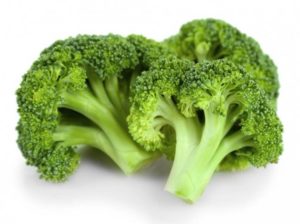
Broccoli contains sulforaphane, a vegetable compound found in cruciferous vegetables that may contain potent anti-cancer properties.
One study on a test tube showed that sulforaphane reduces the size and number of breast cancer cells by up to 75% (1 reliable source).
Likewise, an animal study found that treating mice with sulforaphane helped eliminate prostate cancer cells and reduced tumor size by more than 50%.
Some studies also have found that eating more cruciferous vegetables such as broccoli may be associated with a lower risk of colorectal cancer.
An analysis of 35 studies showed that consuming more cruciferous vegetables was associated with a lower risk of colorectal cancer (source 3).
Including broccoli with a few meals per week may come with some anti-cancer benefits.
However, keep in mind that the research available has not directly considered how broccoli affects cancer in humans.
Instead, I restricted study and test tube and animal studies to investigate the effects of cruciferous vegetables or the effects of a particular compound on broccoli. Thus, more studies are needed.
2. Carrots
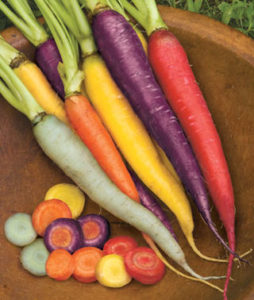
Many studies have found that eating more carrots is associated with a lower risk of developing certain types of cancer.
For example, an analysis looked at the results of five studies and concluded that eating carrots may reduce the risk of stomach cancer by up to 26%.
Another study found that eating more carrots was 18% less likely to have prostate cancer.
One study analyzed the diet of 1,266 participants with or without lung cancer. It found that current smokers who did not take carrots were three times more likely to develop lung cancer, compared to those who took carrots more than once a week (reliable source).
Try to incorporate carrots into your diet as a healthy snack or delicious side dish only a few times a week to increase your intake and reduce the risk of cancer.
However, remember that these studies show a correlation between carrot consumption and cancer, but do not take into account other factors that may play a role.
3.Beans
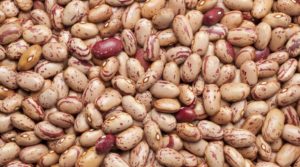
Beans are high in fiber, and some studies have found that they may help protect against colorectal cancer (7, reliable source, 8 trusted source, 9 trusted source).
One study followed 1905 people with a history of colorectal tumors and found that those who consume more cooked and dried beans tend to reduce the risk of tumor recurrence.
Also read: Avocado Benefits: 16 Reasons to Eat This Wonderful Fruit
An animal study also found that feeding black mice or marine beans and then inducing colon cancer impeded the growth of cancer cells by up to 75%.
According to these results, eating a few portions of beans each week may increase your fiber intake and help reduce the risk of cancer.
However, current research is limited to animal studies and studies that show correlation, not causation. More studies are needed to specifically
examine this in humans.
4.Berries
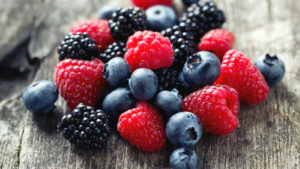
The berries contain a high content of anthocyanins, and vegetable dyes have anti-oxidant properties and may be associated with a lower risk of cancer.
In one human study, 25 people with colorectal cancer were treated with raspberry extract for seven days, which was found to reduce the growth of cancer cells by 7%.
Another small study gave freeze-dried blackberries to patients with oral cancer and showed that they lowered the levels of some signs associated with cancer progression.
One animal study found that giving freeze-dried black raspberry mice reduced the incidence of esophageal tumors by up to 54% and reduced the number of tumors by as much as 62%.
Likewise, another animal study showed that raspberry extract was found to prevent mice from many biomarkers of cancer.
Based on these results, including providing two or two berries in your diet each day may help prevent the development of cancer.
Keep in mind that these animal and monitoring studies are looking at the effects of a concentrated dose of raspberry extract, and more human research is needed.
5.Cinnamon
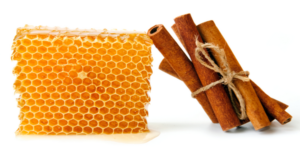
Cinnamon is well-known for its health benefits, including its ability to lower blood sugar and relieve inflammation.
In addition, some studies have tested the test tube and animals that cinnamon may help prevent the spread of cancer cells.
A test-tube study found that cinnamon extract is able to reduce the spread of cancer cells and cause their death.
Another study on the test tube showed that cinnamon essential oils inhibited the growth of head and neck cancer cells, and the tumor size significantly decreased.
Also read: 10 Healthy Foods That Are High in Vitamin D to Consume During Quarantine
An animal study also showed that cinnamon extract causes cell death in cancer cells, as well as reducing the growth and spread of tumors.
Including 1/2 to 1 teaspoon (2-4 grams) of cinnamon in your diet daily may be helpful in preventing cancer, and it may come with other benefits as well, such as low blood sugar and low inflammation.
However, more studies are needed to understand how cinnamon can affect the development of cancer in humans.
6. Nuts
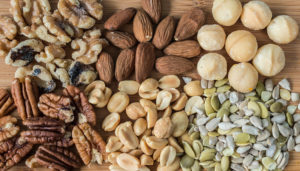
SEEDS AND NUTS DIGESTION
Research has found that eating nuts may be associated with a lower risk of developing certain types of cancer.
For example, a study looked at the diets of 19,386 people and found that eating more nuts was associated with a lower risk of dying from cancer.
Another study followed 30,708 participants for up to 30 years and found that eating nuts regularly was associated with a lower risk of colon, rectal, pancreas, and endometrial cancer (22 reliable sources).
Other studies have found that certain types of nuts may be associated with a lower risk of cancer.
For example, Brazilian nuts contain a high content of selenium, which may help protect against lung cancer in those with low selenium content (23 reliable sources).
Also read: 11 Simple Home Remedies to whiten your teeth naturally
Likewise, one animal study showed that feeding nut mice reduced the growth rate of breast cancer cells by 80% and reduced the number of tumors by 60% (24 reliable sources).
These results suggest that adding a serving of nuts to your diet each day may reduce your risk of developing cancer in the future.
However, more studies are needed in humans to determine whether nuts are responsible for this association, or whether other factors are involved.
Summary
Some studies have found that eating increased amounts of nuts may reduce the risk of cancer. Research shows that some specific types, such as nuts and Brazil, may also be associated with a lower risk of cancer
7.Olive oil
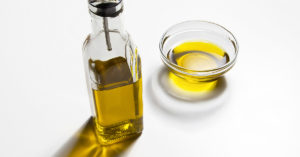
Olive oil is full of health benefits, so it’s not surprising that it is one of the staple food in the Mediterranean.
Several studies have found that consuming more olive oil may help protect against cancer.
A massive review of 19 studies showed that people who consumed the most olive oil had a lower risk of developing breast and digestive cancer than those who had the lowest intake (25 reliable sources).
Another study examined cancer incidence rates in 28 countries around the world and found that areas with higher consumption of olive oil had reduced rates of colon and rectal cancer (26 reliable sources).
Also read: 11 Simple Home Remedies to whiten your teeth naturally
Replacing other oils in your diet with olive oil is a simple way to take advantage of its health benefits. You can sprinkle it on salads and cooked vegetables, or try to use it to season meat, fish, or poultry.
Although these studies show that there may be a link between consuming olive oil and cancer, there are other potential factors as well. More studies are needed to consider the direct effects of olive oil on cancer in humans.
8.Turmeric
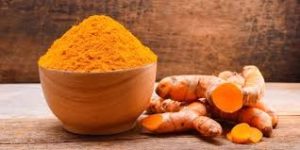
Turmeric is a type of spice known for its health-enhancing properties. Curcumin, its active ingredient, is a chemical that has anti-inflammatory, antioxidant, and even anti-cancer effects.
One study looked at the effects of curcumin on 44 patients with colon lesions that could become cancerous. After 30 days, 4 grams of curcumin daily reduced the number of lesions present by 40%.
In a test tube study, curcumin was also found to reduce colon cancer cell proliferation by targeting a specific enzyme related to cancer growth (28 reliable sources).
Another study on a test tube showed that curcumin helped kill head and neck cancer cells (29 reliable sources).
Curcumin has also been shown to be effective in slowing the growth of lung, breast, and prostate cancer cells in other test-tube studies.
For best results, target at least 1/2 teaspoons (1-3 grams) of ground turmeric daily. Use it as ground spices to add flavor to foods, and pair it with black pepper to help boost its absorption.
9.Citrus fruits
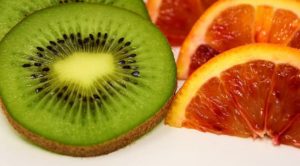
Citrus fruits
Eating citrus fruits such as lemon, lemon, grapefruit, and oranges have been linked to a lower risk of cancer in some studies.
One large study found that participants who consumed a greater amount of citrus fruits were less likely to develop gastrointestinal and upper respiratory cancers.
A review examining nine studies also found that eating more citrus fruits was associated with a lower risk of pancreatic cancer (34 reliable sources).
Finally, a review of 14 studies showed that consuming large amounts of citrus fruits or at least three servings per week reduces the risk of stomach cancer by 28%.
Also read: 16 Super Foods that Boost Immune System in Children During Coronavirus
These studies suggest that including a few portions of citrus in your diet each week may reduce your risk of certain types of cancer.
Note that these studies do not take into account other factors that may be involved. More studies are needed on how citrus fruits particularly affect the development of cancer.
Go to the Next Page To See more Surprising Foods

